Mickey Raphael Talks Playing Harmonica with Bob Dylan on This Summer’s Outlaw Tour
Plus playing on other Dylan-Willie collaborations, including Rolling Thunder, Bobfest, and "Heartland"
Flagging Down the Double E’s is an email newsletter exploring Bob Dylan concerts throughout history. Some installments are free, some are for paid subscribers only. Sign up here:
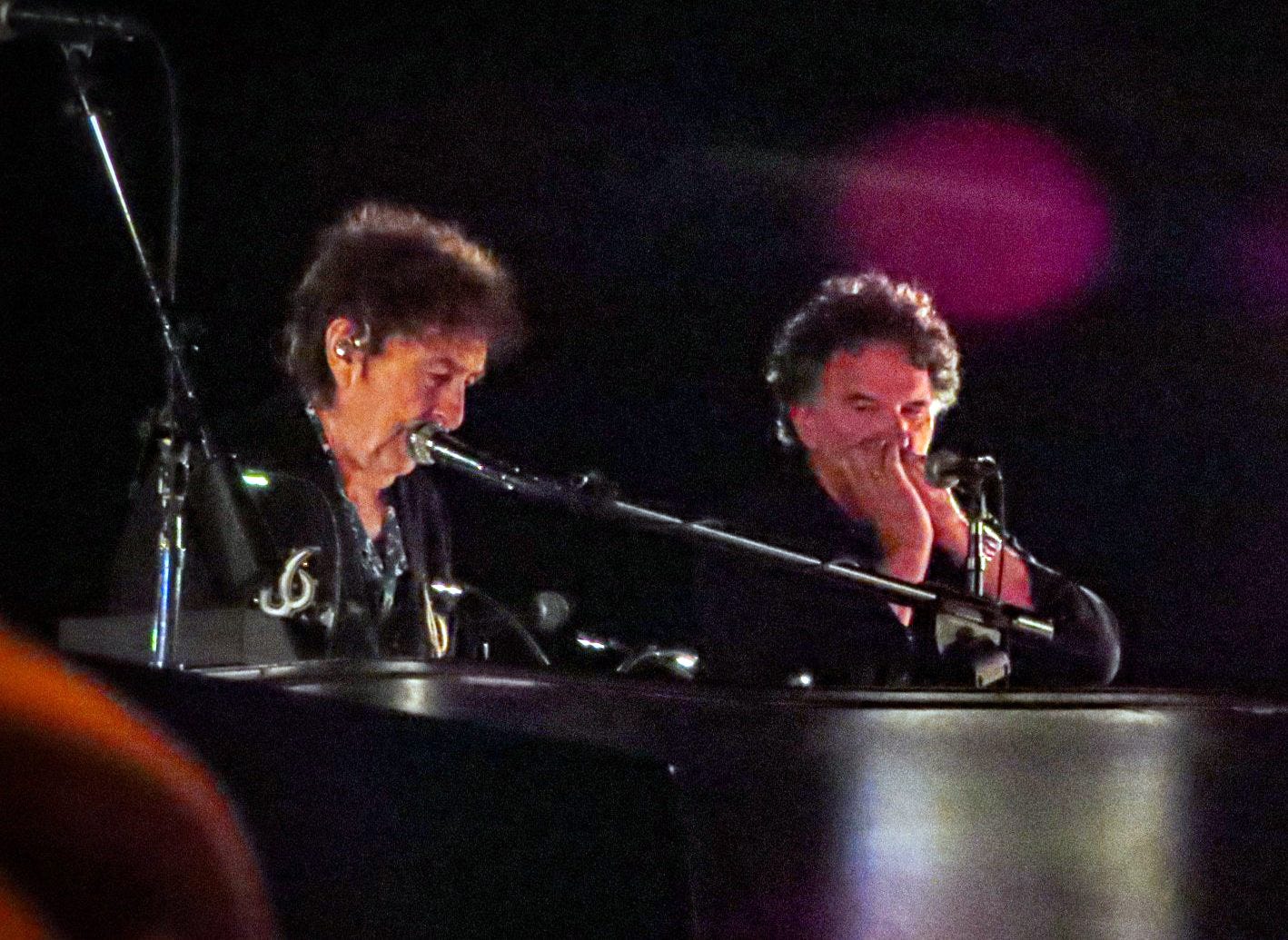
Harmonica virtuoso (Bob’s words, not his) Mickey Raphael has been in Willie Nelson’s band for over 50 years. But, on this summer’s Outlaw Tour, he pulled double duty. In addition to playing with Willie every night (and, for the first few shows when Willie was sick, Willie’s son Lukas), he sat in most nights with Bob Dylan, adding beautifully melodic harp lines to “Simple Twist of Fate.” By the end, Bob added him to “Ballad of a Thin Man” too.
Raphael recently told me all about those Outlaw Tour sit-ins, as well as other times he’s performed onstage with Dylan over the decades, dating all the way back to the second Rolling Thunder tour. Plus he gave me an expert’s view on Dylan’s own harmonica playing.
You guested at almost every Outlaw show this summer, mostly on “Simple Twist of Fate” but then by the end on “Thin Man” too. How did you get the nod? Bob Dylan has a lot of guest guitarists show up, but almost never a guest harmonica player.
I don’t think ever. The first couple of nights [before I got the invite], I was watching from the side of the stage, because I am a fan, number one. His guys were telling me that he said during rehearsal, “Maybe we can have Mickey play on this song.” I just happened to be in his eye line before one of the shows and he said, “Hey, you want to play?” It’s like, “Well, sure!” He goes, “Okay” then he walks out on stage.
That was it? No soundcheck, no rehearsal, no nothing?
No nothing. He trusts me well enough to come out there without any discussion before. If he’s got to tell me what to do, then he can do it himself.
It was not a cakewalk. Every night was a little bit of tension of me just wanting to please him. It wasn’t like I even focused on the audience. I’m playing it for him, basically. It could have just been he and I in a room. That’s all I focused on, what he was doing.
It wasn’t like, “Okay, here’s your solo. Go play every hot lick you know.” It was dead-on focused, creating art in real time. There was no showoff time.
How does that compare to when you’re playing with Willie, who you’ve played with for so many years? Do you have more set parts on “Whiskey River” or “Always On My Mind” or whatever? How much of that is improvised?
It’s all improvised. What’s kind of locked-in is when I play, but then that’ll even change sometimes. Sometimes he’ll look at me if he doesn’t feel like taking the solo.
But I don’t have the newness. I’ve got such a history with Willie. There’s not that tension or nervousness or not knowing what he wants. Because I don’t know what Bob wants. Every night, he was very complimentary. It is nice to get those accolades from him. He was very sweet and supportive. But the reward was just being able to create in real time with him, and then being asked back the next night. So I didn’t take anything for granted. We did the whole summer, but every night was like an audition, at least to me.
If you asked him, he might say, “Ah, I just want Mickey to play, he can do whatever he wants.” But I took it pretty fucking serious.
Bob was one of the guys that really influenced me in my formative years. When I decided I wanted to learn how to play the harmonica, who were the people I was listening to? It was Dylan. It was Neil Young. Not really the Chicago blues guys at all. I was more into the folk scene. Bob set the pace in that style.
Were there specific songs or albums of Dylan’s?
Any of the first three or four records. Blonde On Blonde. I was in high school in the ‘60s, so anything that was going on from ‘64 on was really my formative years as a teenager wanting to play. He was the template when I started my journey. Later I got into the Chicago-style players and the blues guys, but I started playing with singer-songwriters.
As someone who knows infinitely more about the harmonica than I do, how would you describe Bob Dylan’s harmonica playing? His technique, his style. And has it changed between those ‘60s records and what he just does more recently?
Everybody gets a little better and more precise. I think the stuff he did on the Lanois records, Time Out of Mind and Oh Mercy, is some brilliant harmonica playing. I love what he’s doing on “What Was It You Wanted” and “Shooting Star.”
One thing about Bob is his playing is so emotional. When he introduced me, he was very gracious. He said, talking about the harmonica, “I play this thing, but this guy is a virtuoso.” I said that was very kind of him to say. I am not a virtuoso. Bob does a lot of things; I got one trick and that’s playing the harmonica.
There’s no way that’s true.
It’s just that Bob-- I love the minimalist approach that Bob takes. A lot of harmonica players have a problem playing way too much. His playing is total emotion.
As a non-player, I think “harmonica technique” and I think of seeing people do that little hand move where it makes the notes fluttery and stuff like that. My sense is Dylan doesn’t do that sort of move.
I don’t either, really. It kind of gives you a wah-wah effect. If you are up to an acoustic mic and just holding a harmonica and put your hand around it and then open your hand, it changes the tone a little bit. Some of the old blues guys do that. But it wouldn’t fit Bob’s style of playing. He plays pretty much with his hand open. That gives a really clean, clear tone, which is kind of the way I play, too.
Why do you prefer playing that way?
Because I like the tone. I don’t need a wah-wah kind of sound. It’s just an effect that you wouldn’t use all the time. Or it’s just a nervous hand movement that some players do. I don’t find any use for it in my playing.
I just hold the mic in my hand. Or, when I played with Bob, I just played on a vocal mic. I might cup my hand around it, just to keep the sound going in a direction, but I won’t close my hand. I keep my hand open.
Is that a different sort of mic than you play with in your own show with Willie?
When I play “Georgia [on My Mind],” I’m playing with the mic on the stand. It’s the same mic that I would use with Bob. So when I want a really clear tone, I would use the mic on the stand. When I hold the mic in the hand, it gives it a fatter sound, a warmer sound. I like both sounds.
For Bob, he just holds the harp in one hand, or two hands, and keeps his hands open just to get the full tone. I mean, you hear actually what the harmonica sounds like.
And I think he plays it into the same mic he’s singing in.
Yeah. He’s used handheld mics before. If he uses another mic, it might change the tone a little bit. But it can just get in the way. Less is more. The harmonica is like a voice, so you might as well just mic it like a voice. Then the sound really comes from you and is not electronically processed or anything.
Now, in the past, I think he might have played through a bullet mic, which would have gone through an amp. That’s a real dirty kind of tone. But I haven’t seen him do that in a while.
Subscribe to Flagging Down the Double E’s for many more interviews like this one (and, you’re a harmonica fan, check out my recent breakdown of Dylan’s own harmonica solos)
What I learned from him too on this Outlaw Tour, he doesn’t really tell you what he wants you to play. The reason I’m there is because of my skills, and I shouldn’t have to be told anything. I guess the attitude is, “If I got to tell you, I can do it myself.”
For somebody else, I might do some kind of preparation, at least have a very good understanding of the song in advance. With Bob, it’s different every night, so when I walk out on stage, my mind is totally clear. I have no idea what I’m going to play until we start doing it. I’m watching his hands on the piano and playing with him in the moment. He doesn’t have to tell me what to play, because he’s kind of conducting me in a very subtle way with what he’s doing on the piano.
I know the words, so I know what kind of attitude or what kind of feel to portray, but as far as musically and timing and phrasing, I’m totally following him. It’s not something that he can tell me beforehand. He may not know beforehand, before he gets up there and starts playing. It is all stream of consciousness and very much in the moment, which I’ve never done before. Every night that I would go out and play with him on this Outlaw Tour was new and fresh. If I played something one night, I knew not to count on playing it the next night the same way.
Every night was like an audition almost. Not really, but it was like the heat was on to come up with something. I don’t want to say I had to read his mind, but I had to react spontaneously to what he was throwing me. It was a great exercise, very zen-like. He’d do the first three verses kind of rubato, almost spoken word with a little musical background, and then we would go the solos.
Again, it would just be totally stream of consciousness and total improvisation to react off what he was doing. I’m listening to him and watching his hands so I can see when they raise up and get ready to hit the keys. Or when he’s holding a note down and then he lets up, I am stopping with him immediately. It’s almost like having a conductor there.
Wow, that precise. You’re trying to sort of mirror.
I’m trying to. I want to be an extension of his hands.
No two nights are the same. It wasn’t like, “Oh, I nailed it tonight, the rest of the tour is going to be a breeze.” I wasn’t sure till I got out there if he was going to want me to play. If he didn’t say, “Don’t come out,” I figured that I was in for the next night. If he didn’t say, “Go away” or “Thank you for your service.” If he doesn’t have to mention your name, then you killed it.
I’ve completed my bucket list, man. To play with Bob has always been a dream of mine. I never entertained it for real, because he’s such an iconic harmonica player, he doesn’t need to bring anybody else out there.
It was mostly “Simple Twist” but by the end, you’re doing some “Thin Man” too. How did that happen?
One night after the show we were talking, and he goes, “Hey, why don’t you just stay up there till we end the show?” Because “Simple Twist of Fate” was the next-to-last song, then “Ballad of a Thin Man,” which was kind of a rocker the way they played it.
There again, you never really know when to play, so you talk to the band and say, “Do I fill the verses?” “No, don’t fill.” It kind of morphed what I was playing. The first time I played it, I was very sparse. The second time there was a little more room to play. I’m still a guest there so I don’t want to take up too much space. As the days went on, I got a little more confident.
You learn his signals too. It just might be him looking over his shoulder. It could just be a lean or a nod. You have to read those signs. With Willie, I know everything he’s doing. He doesn’t even have to look at me. I can tell, if he’s putting his weight on his left side and not grabbing the guitar, it’s my time to solo. With Bob, I don’t have that 50-year longevity with the guy.
There’s a mutual respect. I mean, I so respect him, but I don’t want to be too intimidated by him either. He’s not just getting me up there to stand next to him. He wants me to play.
The solos you played were great, but also one thing I enjoyed is hearing the harmonica more integrated into the whole song. When Dylan himself is the harmonica player, no one is playing harmonica while he’s singing obviously. It’s more “Now it’s harmonica-solo time,” and then it disappears again.
Well, I wouldn’t play when he was actually singing-singing, I don’t think. You don’t want to take away from the vocal. That’s a no-no with anybody. There’s two guitar players in there too. I look to them too, to see if they’re going to fill. I don’t want to take something away that somebody might have already been doing. If they’re not doing anything, if Bob is not doing anything, then I could play. Sometimes Bob Britt will give me a nod too, or Tony [Garnier]. One time, Tony said, “Go ahead and play on this next verse.”
It seems to be a living, breathing thing and nothing is written in stone. He’s a great bandleader, because he’s conducting that band. It’s just very subtle the way he does it. You’ve got be able to read the signals.
You know what I love too is people posting videos. Before, at these Bob shows, you couldn’t take a camera in. I never would have been able to check to see if I was playing right. [But on the Outlaw tour,] people would post videos on YouTube from the night before. I could watch it and go, “Let me change this” or “Don’t do this again.”
Zooming out from Bob specifically, how was the rest of the Outlaw Tour? I was lucky that I saw both incarnations of it, the Robert Plant & Alison Krauss half and then the Mellencamp half. What do you remember?
Were there other people on the show? I didn’t even pay attention. [laughs]
No, Robert Plant and Alison were great, of course, and the players in their band are stars themselves. One thing about the Outlaw Tour is that it was something that I would have sat out in the audience and watched from top to bottom. Mellencamp, when he toured with us, it’s like listening to the record. It’s such a well-rehearsed band. It was a long time, but it was just great camaraderie.
I’m trying to remember the last time I saw Bob. I saw him at the Brooklyn Bowl in Nashville [in March 2024]. That’s the first time I saw this incarnation of the band.
It was a highlight of my career to be able to have that time to play with him and the band. It just never got old. Every night, it felt new.
Can we go in the time machine and zoom back to when you first overlapped with Dylan? Were you in Willie’s band at that Rolling Thunder show in Houston back in ‘76?
Yes. In fact, I’ve got a picture somebody took, it’s everybody on stage, and Bob is nodding at me to take a solo. Then Willie raises his hand up and ends the song. [laughs]
Oh no!
I hadn’t met Bob at that point, but that was my first acknowledgment.
Then it gets inadvertently ripped away from you.
Exactly.
Was that the first time you met Dylan, or did you not even exchange words?
No, I didn’t meet him till the Sony 30th Bob Dylan celebration.
You didn’t meet at the first Farm Aid either, which Dylan inspired?
No. He was playing with Petty at the time. I did not meet him till that 30th, just during the rehearsals.
Where you and Willie did “What Was It You Wanted,” which you mentioned already as having this great harp part on Oh Mercy.
It’s one of my favorite harmonica parts I’ve ever played, when we recorded it and then did it live on that show. Totally inspired by Bob.
What else do you remember about that 30th anniversary?
It was just the most amazing show ever. We shared a dressing room: Johnny Cash, Kristofferson, Willie, Lou Reed, George Thorogood. That was our little dressing room.
Booker T. was in the band, and G.E. Smith was the band leader. He brought me up to play with George Harrison.
Had you ever played with George before?
No. I never met him, still to this day. It was G.E. saying, “Just come out and play.” I didn’t rehearse it, and George didn’t know who I was. That band was so big, I guess he didn’t really care.
Were you there the next day when Willie and Bob recorded “Heartland”?
Yes. We were working on the whole Across the Borderline record. We cut the track and then Bob came in to do his vocals.
That must have been your first in-studio interaction with Dylan.
We weren’t really there. We had all left because he likes to work by himself, and at that point we didn’t really have a rapport with him. We were all in one green room or something just hanging out while they went in to work. He didn’t need a bunch of us hanging around watching him sing. That’s something’s very private; you want to do it without an audience.
There’s a whole host of other Bob performances that you’re involved with. Usually alongside Willie, but one that wasn’t was his duet with Trisha Yearwood for a TV special 1994.
I was part of the house band. I really didn’t have any kind of rapport with him at that time, because there was so much going on. There were a lot of acts on that bill. He just said—or maybe Don Was, the bandleader, said, “Bob wants you to play the intro.” Bob played the intro on the record, so I said, “Maybe you should play it.” But they said, “No, he wants you to play it.” I don’t know why Bob didn’t want to play the intro, other than maybe just sharing that with me.
I read the idea was duets pairing rhythm and blues and country acts. So Lyle Lovett with Al Green, stuff like that. Which I’m not quite sure how Dylan and Trisha Yearwood fit.
I think they just happened to be available. They were kind of thrown together at the last minute. It got to be such a fun project. It followed a particular record, Rhythm, Country and Blues, and I guess they thought, “Hey, we can expand this.”
At Willie’s 60th birthday thing. I see someone playing accordion on their “Pancho and Lefty” duet. Is that you?
Yes.
I didn’t realize you played accordion.
I don’t really, but I could play on that song. There’s a couple of songs we do that I am playing the accordion. Bob even said, “Oh, I hear you play accordion. Maybe we’ll find something for you to play on.” Of course I said, “Well, yes, of course I play accordion!”—which I don’t. I play accordion like somebody just picked up a harmonica and started playing it. If you’re in the right key, you can’t play any wrong notes. I’m learning. Maybe if we do this again next summer, I can be a little more aggressive and tell him, “I brought my accordion.”
I love the conjunto, the Tejano-type playing like David Hidalgo plays on a bunch of his songs, but I’m not that type of player. I don’t have those skills yet, so I’m really just playing it like a harmonica. Very simply, but it adds nice color. I think accordion would be a great addition to his band.
Do you know Donnie Herron? For a little while he played accordion on “Key West.”
Will you send me a video of that? I knew that they bought him a bunch of accordions. He can play anything.
Then I can also listen to “Hard Times.” He did it when John Jackson was in the band, and Bucky [Baxter] played a Cajun accordion. I can do that. I was actually playing that song the other day. Of course, if I play with him again, it doesn’t mean it’s going to be similar to anything he did in the past, the way he works, but it just helps to hear that kind of stuff.
You know who else has sat in on accordion with Bob Dylan: Sheryl Crow.
She plays the keyboard accordion, and I’m playing the button, but anything you run across that has accordion with him, let me know. Maybe I can figure it out.
For the layman, what is the difference between the keyboard and the button accordion?
The keyboard, when you push down a note, the bellows just blow air over the note. Whereas with a button, if you push, it’s one note; if you draw, it’s another note. Sort of like the harmonica, inhaling and exhaling.
One show I wanted to ask you about is at the El Rey in LA. Same run that Sheryl was at. There’s this great audio I found of Willie’s opening set, but the only person there from Willie’s usual band is you. It’s you and Willie backed by most of Bob’s band: Tony, Larry and Bucky. Do you remember anything about that show?
I remember being so excited to play in that tiny little club. Those are my favorite gigs. It was just going to be Willie and myself, but then we get there, and course we know Tony from way back from Asleep at the Wheel. We said, “Play with us” and taught him the show like an hour before we went on. Then he had to leave to do Bob’s setlist. We probably got maybe 45 minutes—not a rehearsal, but a discussion about the songs, so they are totally winging it with us.
Do you remember anything about the TV special called Outlaws and Angels in 2004? Bob and Willie do “You Win Again.”
Same type of thing. I was in the house band. I don’t know if Bob picked the song, or Willie. It’s just one of those things that just kind of happens organically.
There’s a funny short video of you all rehearsing the song, and he’s wearing that ridiculous blonde wig and knit cap.
I’ve seen that before, but I don’t really remember that. Other than he can’t just walk into a place; he’s a very private person. I assume he would wear some disguises. I’ve never seen him out in public, so I don’t know, but that sounds like what that would be. Maybe he drove himself there or something.
Shortly after that one, you did a number of these summer tours together at the minor league ballparks.
I would watch Bob’s set every night. I wish he had played more harmonica. I love hearing him play, and there’d be times where he wouldn’t. Actually, on this last Outlaw tour, he was playing a lot more harmonica than I think he has in a while.
It seems like his interest in it ebbs and flows. He’ll go months sometimes without playing it, but then right now he’s in Europe, he’s playing it seven, eight songs a night.
Oh, really? I hadn’t even looked. What’s the setlist? Are they doing “Simple Twist of Fate”? Or what was the last song we did?
“Ballad of a Thin Man.”
“Mr. Jones” is what it says on the cue sheets. Are they doing that?
Nope, not doing either anymore.
Well good. Maybe he’s saving them for me. [laughs]
I need to pick a couple of accordion songs that I can pitch him. I would love to be able to do that. I’ll start practicing.
Is there any talk of another run of this next summer, or is it too early for that planning?
It’s too early to see what’s going on, but I know that they enjoyed it.
I was at the first night, in Alpharetta, where that afternoon they announced Willie was sick and wouldn’t perform. His son Lukas took over that first chunk. Do you play differently with Willie versus Lukas?
It’s more aggressive. Because Lukas is louder, we can amp it up a little bit. He did Willie’s whole set, basically, since Willie was sick. There’s definitely a higher energy level when we’re playing with Lukas. Whereas Willie, it’s just sitting around your living room. It’s intimate.
Did that whole thing cast a pall for you all in the Willie camp over the start of the tour?
We were worried about him, but we knew he was okay and he was going to be back. We threw it together that afternoon in Alpharetta. We didn’t know he wasn’t coming until the afternoon. We’re in the dressing rooms, rehearsing the set with Lukas. I thought he did a great job.
Nothing to do with Bob, but I saw this amazing photo with you and Kris Kristofferson, and Kris is wearing a T-shirt that says “Mickey Raphael, number one harmonica player.” What’s the story?
Probably 30, 40 years ago, somebody threw a T-shirt up on stage that said, “Mickey Raphael, number one harmonica player.” It was a fan that just made a homemade T-shirt. Then a couple of years ago, my ex found it in my closet and wore it to a gig. I was playing with Chris Stapleton. Morgane Stapleton, Chris’s wife, says, “That’s great. We have got to get some of those. We’ll sell them at the show.”
Reluctantly, my ex made me print some of those up. I really didn’t ever want to sell T-shirts. I’m not in that business. There’s this website called Shop Midnight Rider that does vintage shirts. They made these up and sold them online for a while, and they gave me a handful. It was more for promotion, but there were a lot of fans that were buying them. Kris has one, and Jeff Bridges and Bono. I think they’re going to do it again because Neil was wearing one the other day when he did his box set review.
It’s a really comfortable shirt. It was Kris’ favorite shirt because it was one of these distressed tees that felt like it was a hundred years old. He told me he loved wearing that shirt, so he would wear it when he would play, when I wasn’t around even.
I have one more Dylan-related question. The Dylan world was abuzz about this time last year for Bob’s surprise set at Farm Aid. Did you know in advance that was going to happen?
Yes, I knew, but I wasn’t there because I had COVID. I was watching it on TV. Just like, “Oh, man, this would’ve been an opportunity for me to get back in his eye line or something.” I’m sorry I missed that.
Just playing with Bob, it made me get through the summer. It helped me. I’m not bored playing with Willie, but it’s the same stuff, basically. It was something new every day that I couldn’t plan for.
Keep you on your toes.
Yes. It never got old. It never got repetitive. I really learned how to listen, which is important, especially for a harmonica player. For any musician, I think the most important thing is, you can learn your skill on the instrument, but then you’ve got to learn how to listen. That’s probably the hardest thing, knowing when not to play. “Less is more” is one of Willie’s mantras.
He’s got that jazz side of him, and that’s such a classic jazz thing, the space between the notes.
I got to spend a little time with Miles Davis, and that’s what he would tell me. He goes, “A lot of times, it’s important not what you play, but what you don’t play.”
I hope I didn’t overdo my welcome, but I think I did good. I think I was complimentary to him and did not showboat.
Clearly, he thought that, and I can tell you as someone who’s plugged into the fan response, people were excited when you started coming on stage.
There was one person who said a disparaging word right at the beginning, I think. Because I thought I’d get more “Let Bob play!” or something. One person said something, but that’s all I saw. Most of it was pretty positive. His fans are pretty loyal like Willie’s, right?
Very loyal. I’m only in my 30s, but a lot of people have been with him for decades now.
I didn’t want to tell him, “You’re such an influence.” He wants to hear about Muddy Waters and Howlin’ Wolf. He doesn’t want to know that the buck starts with him, you know what I’m saying? He was my entry drug into the harmonica, and then I dug deeper to find out where that all was coming from. That’s one thing you can’t really tell him.
You mentioned Muddy and Howlin’ Wolf. Did you guys talk about any of that blues stuff?
A few years ago, yes. When we were on the ballpark tour, I get a call from his bodyguard at the time. He said, “The boss wants to talk to you.” I went over to his bus and he had this stack of blues DVDs. He knew I was a Paul Butterfield fan. He knew so much about me. I’d never really had a conversation with him, but he knows everything that’s going on. I lived in Malibu at the time, and he was saying, “Is your house okay in the fire?” It’s like, “How the fuck do you know where I live?” [laughs]
So he was telling me about Butterfield being on To Tell the Truth, and he had these DVDs from this German folk music series American Folk Blues Festival. It’s got Howlin’ Wolf, Sonny Boy Williamson, Otis Spann. They’re all black and white. He had a stack of these DVDs that he wanted me to listen to.
Like a homework assignment?
Yes, exactly. It was like, “I’ll take Mickey into my confidence. He seems worthy of getting this knowledge.” It was like something he wanted to share with me.
So we sat outside and spent a little time talking about all this stuff. He was just very sweet and very normal. He just wanted to talk about this great collection of blues DVDs.
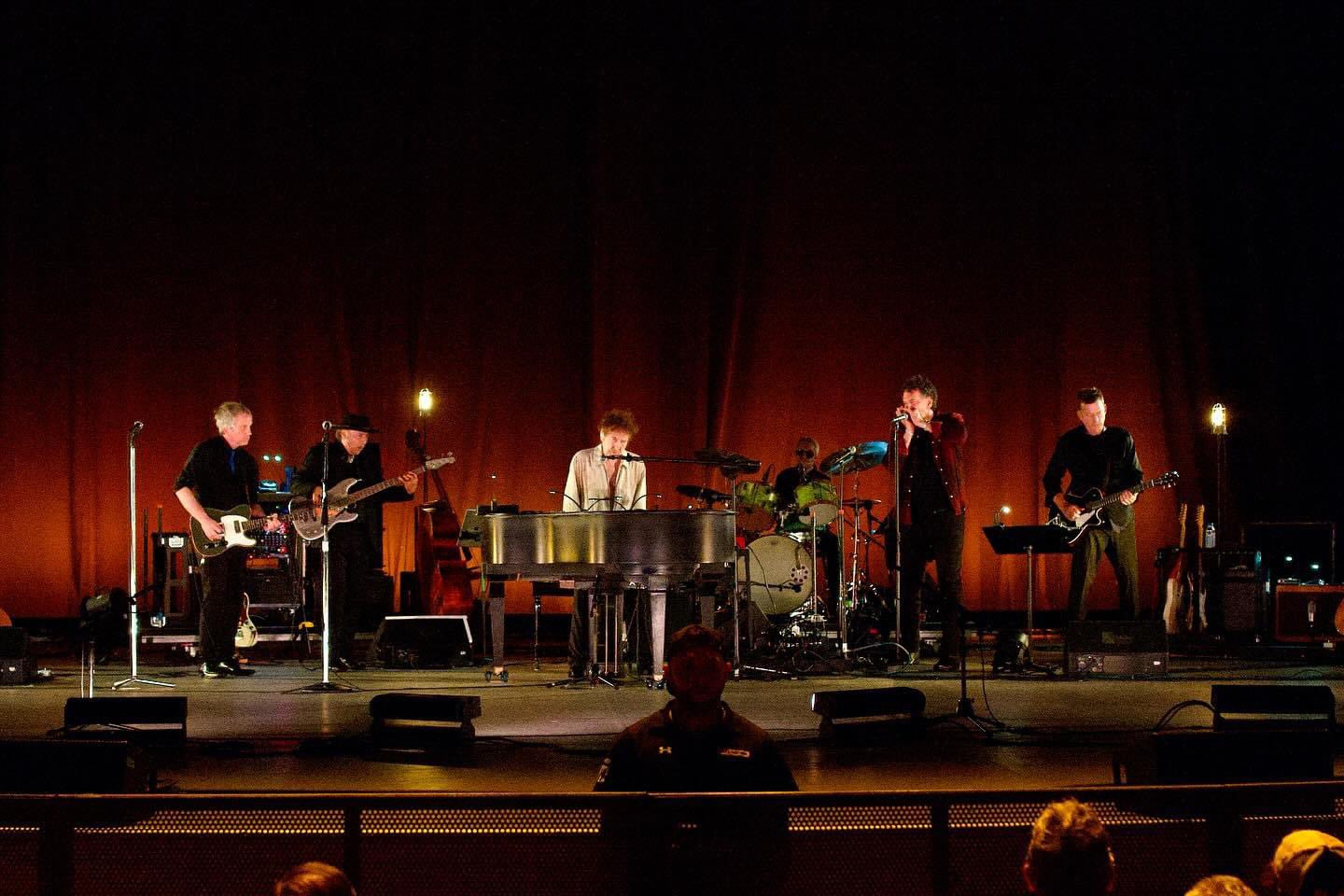
Thanks Mickey! Hear him on both of the ever-prolific Willie’s two albums this year, The Border and Last Leaf on the Tree (as a matter of fact, he plays accordion on both title tracks!). Find out more at mickeyraphael.com.



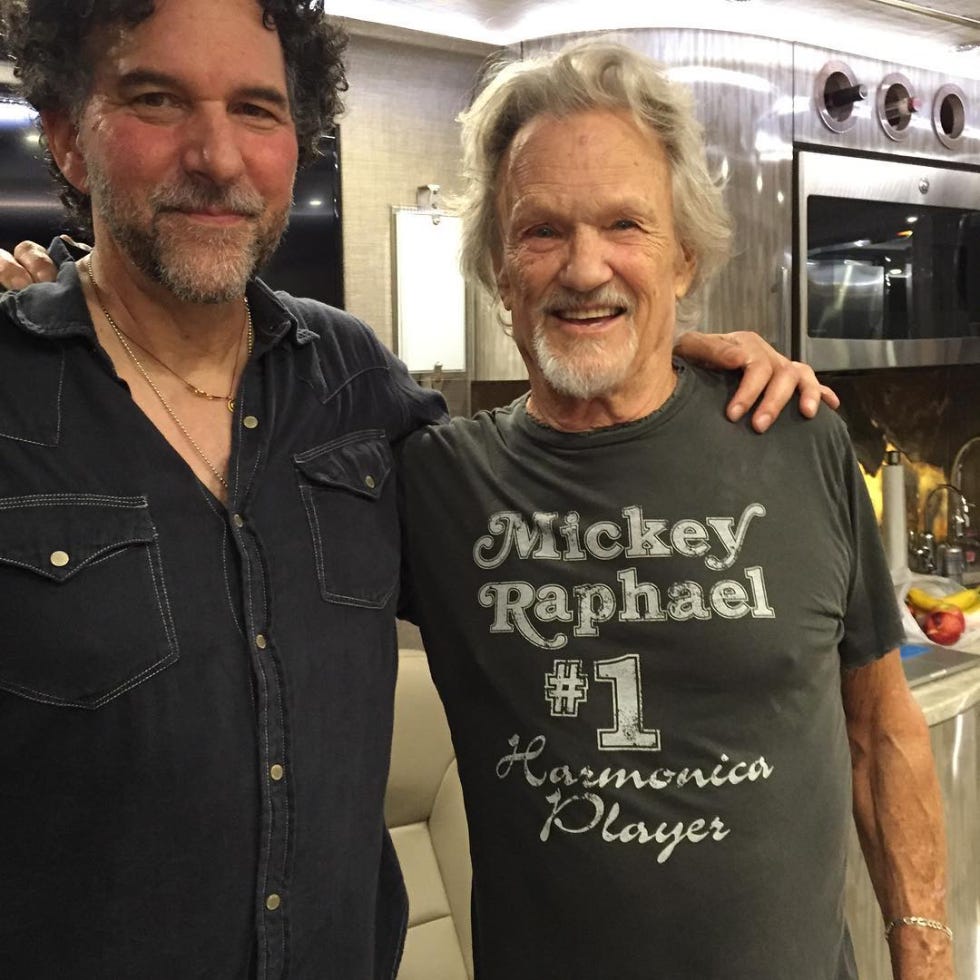
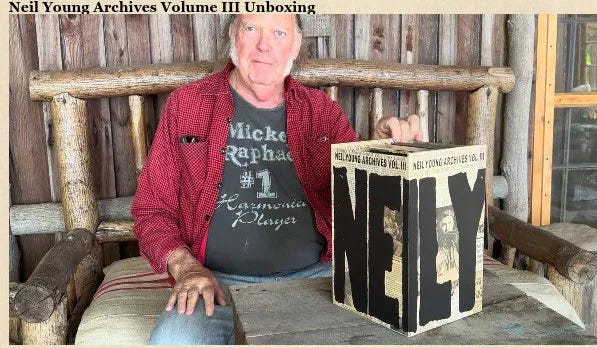
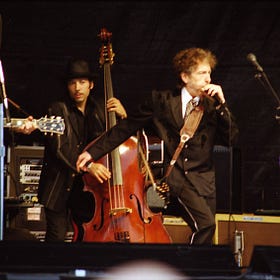
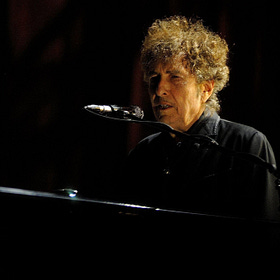
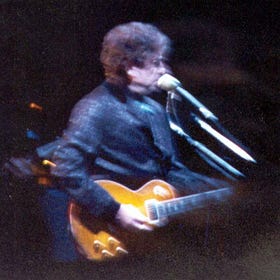
What a great interview, Ray - so cool to hear from Mickey!
["While rubato is often loosely taken to mean playing with expressive and rhythmic freedom, it was traditionally used specifically in the context of expression as speeding up and then slowing down the tempo."]
Mickey is my all-time favorite harmonica player, no contest. HIs solo on Willie's version of "Georgia On My Mind" is one of the most perfect moments in recorded music.
What a fantastic interview!